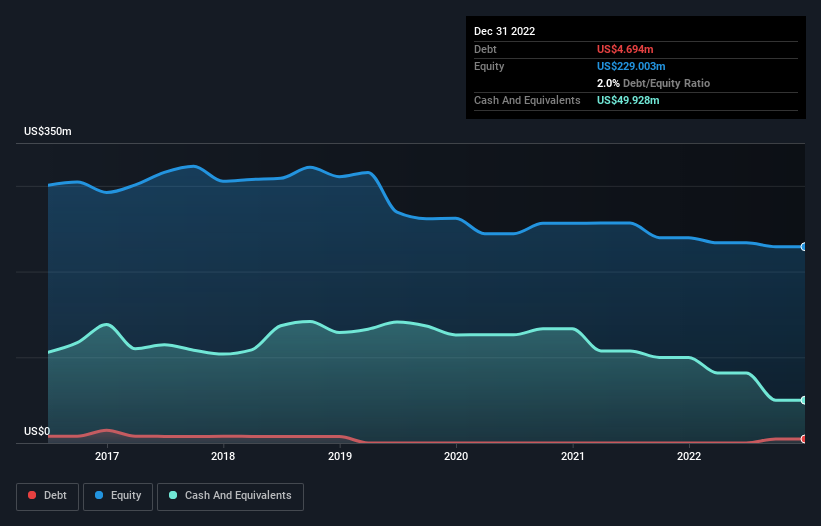David Iben put it well when he said, 'Volatility is not a risk we care about. What we care about is avoiding the permanent loss of capital.' So it might be obvious that you need to consider debt, when you think about how risky any given stock is, because too much debt can sink a company. Importantly, Chuan Hup Holdings Limited (SGX:C33) does carry debt. But should shareholders be worried about its use of debt?
Why Does Debt Bring Risk?
Debt and other liabilities become risky for a business when it cannot easily fulfill those obligations, either with free cash flow or by raising capital at an attractive price. Ultimately, if the company can't fulfill its legal obligations to repay debt, shareholders could walk away with nothing. However, a more usual (but still expensive) situation is where a company must dilute shareholders at a cheap share price simply to get debt under control. Of course, debt can be an important tool in businesses, particularly capital heavy businesses. When we examine debt levels, we first consider both cash and debt levels, together.
View our latest analysis for Chuan Hup Holdings
What Is Chuan Hup Holdings's Net Debt?
The image below, which you can click on for greater detail, shows that at December 2022 Chuan Hup Holdings had debt of US$4.69m, up from none in one year. However, its balance sheet shows it holds US$49.9m in cash, so it actually has US$45.2m net cash.

A Look At Chuan Hup Holdings' Liabilities
According to the last reported balance sheet, Chuan Hup Holdings had liabilities of US$6.86m due within 12 months, and liabilities of US$828.0k due beyond 12 months. On the other hand, it had cash of US$49.9m and US$1.19m worth of receivables due within a year. So it can boast US$43.4m more liquid assets than total liabilities.
This surplus liquidity suggests that Chuan Hup Holdings' balance sheet could take a hit just as well as Homer Simpson's head can take a punch. With this in mind one could posit that its balance sheet means the company is able to handle some adversity. Succinctly put, Chuan Hup Holdings boasts net cash, so it's fair to say it does not have a heavy debt load! There's no doubt that we learn most about debt from the balance sheet. But you can't view debt in total isolation; since Chuan Hup Holdings will need earnings to service that debt. So if you're keen to discover more about its earnings, it might be worth checking out this graph of its long term earnings trend.
Over 12 months, Chuan Hup Holdings made a loss at the EBIT level, and saw its revenue drop to US$6.4m, which is a fall of 72%. That makes us nervous, to say the least.
So How Risky Is Chuan Hup Holdings?
Although Chuan Hup Holdings had an earnings before interest and tax (EBIT) loss over the last twelve months, it made a statutory profit of US$3.3m. So taking that on face value, and considering the cash, we don't think its very risky in the near term. We'll feel more comfortable with the stock once EBIT is positive, given the lacklustre revenue growth. There's no doubt that we learn most about debt from the balance sheet. However, not all investment risk resides within the balance sheet - far from it. We've identified 2 warning signs with Chuan Hup Holdings (at least 1 which is significant) , and understanding them should be part of your investment process.
Of course, if you're the type of investor who prefers buying stocks without the burden of debt, then don't hesitate to discover our exclusive list of net cash growth stocks, today.
New: AI Stock Screener & Alerts
Our new AI Stock Screener scans the market every day to uncover opportunities.
• Dividend Powerhouses (3%+ Yield)
• Undervalued Small Caps with Insider Buying
• High growth Tech and AI Companies
Or build your own from over 50 metrics.
Have feedback on this article? Concerned about the content? Get in touch with us directly. Alternatively, email editorial-team (at) simplywallst.com.
This article by Simply Wall St is general in nature. We provide commentary based on historical data and analyst forecasts only using an unbiased methodology and our articles are not intended to be financial advice. It does not constitute a recommendation to buy or sell any stock, and does not take account of your objectives, or your financial situation. We aim to bring you long-term focused analysis driven by fundamental data. Note that our analysis may not factor in the latest price-sensitive company announcements or qualitative material. Simply Wall St has no position in any stocks mentioned.
About SGX:C33
Chuan Hup Holdings
An investment holding company, engages in property investment and development in Singapore, Australia, the United States, Europe, and internationally.
Excellent balance sheet with proven track record.
Market Insights
Community Narratives


Recently Updated Narratives

Bisalloy Steel Group will shine with a projected profit margin increase of 12.8%

Astor Enerji will surge with a fair value of $140.43 in the next 3 years

Proximus: The State-Backed Backup Plan with 7% Gross Yield and 15% Currency Upside.
Popular Narratives


MicroVision will explode future revenue by 380.37% with a vision towards success


NVDA: Expanding AI Demand Will Drive Major Data Center Investments Through 2026



